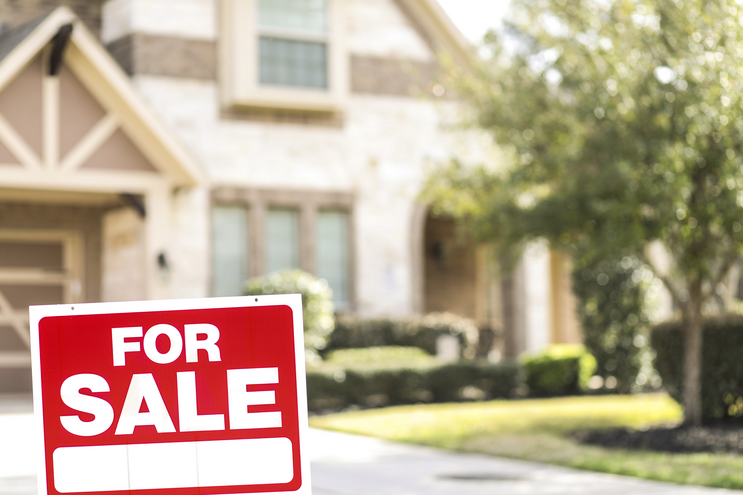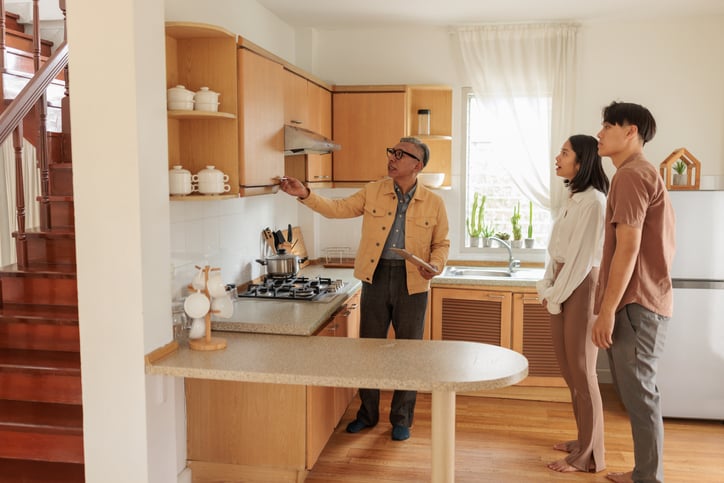This article was updated on April 29, 2022. Contributed from John Allen, RingCentral US
With the limitations that come with the ongoing pandemic as well as the competitive nature of the real estate industry, there's never been more of a need for your business to have a strong digital presence. That includes having an optimized website. Good websites reduce bounce rates and help achieve higher conversion rates. Incorporating these 12 essential elements into your real estate website will help your business stand out from the crowd.
#1 Simple navigation
When potential clients seeking a real estate agent come to your website, you want to make it as simple as possible for them to find the information they need. For that reason, your website should be easy to navigate and accessible to everyone. If particular features are too difficult to find on your site, clients will simply look elsewhere.
Unless you are a specialist real estate professional, your site should have some common features:
- About - A potential client likes to know who they are dealing with. Your About section can list the members of your team, their individual experiences, and some details about the agency itself.
- Listings - Depending on the size of your agency and the number of properties you are representing, you want a clearly distinct real estate listings section. Which properties are for sale or for rent? Differentiate between property types, such as houses and condominiums or commercial and industrial properties.
- Guides - You should have two separate guides; one for buyers and one for sellers. These inform potential clients as to the process they will undergo if they get involved with your agency. Setting out the processes simply and clearly can help clients understand how you will work with them and for them.
- Financing - Although not every agency will offer this, many real estate professionals have close relationships with financial institutions that offer mortgages and property loans. A good working relationship with such an institution may be the reason a client chooses your agency.
- Blogs - Blog posts are a good way to drive traffic to your main website. The posts can cover a range of topics such as local property prices, financing, and even local weather patterns. Blogs can often help provide useful information to first-time homebuyers or people planning to move to your area from out of state.
- Contact - Making it easy for clients to contact you is an essential factor. But in this day and age, that means more than just supplying an email address and phone number. It's vital for future lead capture to be accessible on multiple communication channels. A potential buyer may be partial to one contact method; providing a variety of options will strengthen your real estate website. This is where technology like VoIP phones can help. How do VoIP phones work in real estate? By allowing clients to contact your listed number via a range of devices.
#2 Advanced search options
Most agencies will have a large number of properties on their books at any one time. While simple demarcation between rent/buy, house/condo, etc., may suffice for a simple search, most potential buyers or renters want specific features in their ideal property. An advanced search option lets them whittle down longer lists into a more manageable shortlist of properties they may be interested in. These can include:
- Property type - House, condo, apartment, villa, commercial, etc.
- The number of bedrooms and bathrooms - Give potential clients the option to choose a minimum number of desirable bedrooms and bathrooms.
- Garden or outside space - Give potential clients the option to filter properties with outdoor spaces.
- Budget - Budget will always be a major factor in clients' decisions, so help them narrow down choices to what they can potentially afford.
- Area or neighborhood - A prospective buyer will often want to live in a particular area (or close to it), so allow them to search by area, too.
- House/lot area - Space can often be another important factor, both interior and exterior, so adding this can be a big help.
- Luxury features - This can include things like a swimming pool, BBQ area, or particular amenities in a condo building.
#3 Map location
Linking your listings to Google Maps helps tell potential clients the full story. With a precise map location they can see where the property is relative to local amenities, such as schools, and major transport hubs.
While Google Maps provides an easy-to-understand and use static map, you may want to consider taking this a step further. You could use an aerial photograph of the area to mark local services and amenities, have a graphic designer create a specially illustrated map, or use real estate mapping software to create an interactive map with relevant information.
#4 Responsive design
There are a number of reasons your website should feature responsive design. First and foremost is that such design helps boost the user experience. When your website offers an enjoyable and intuitive user experience, potential clients are more likely to stick around.
Good responsive website design can also improve how people interact with your site in a number of ways. It lets them move through images quickly and seamlessly, and can allow them to bring up property comparisons so they can look at features of different properties. Good web design is no easy task; consider reaching out to a real estate website builder with a proven track record.
#5 Community and neighborhood guides
While you may choose to include this in your blogs, having community and neighborhood guides as a standalone feature can be a great tool for visitors to your site. If someone is moving from a different state or city, it lets them see what the neighborhoods you serve have to offer.
When you put your guides together, remember your potential clients cover all demographic types. To get a better idea of guides that would be relevant to their interests, perform market research or deploy survey forms for your current audience.
Common information could include:
- Local schools, colleges, and universities
- Recreational facilities such as parks, golf courses, etc.
- Sports facilities like gyms, football stadiums, watersports venues, etc.
- Shopping amenities - Include everything from the local businesses to the closest convenience stores, malls, and leisure venues. Make a list of notable restaurants and entertainment venues such as concert halls or nightclubs
- Community groups - Many people like to feel part of a community. Your guide could include any local groups or charities that welcome new members.
- Youth groups - If your area has youth facilities or groups (such as the Scouts or youth sports), include that, too, to inform families.
- Transportation - Whether in an urban or suburban area, people will need transportation. That can include access to the nearest highway or access to public transportation hubs, or even airports.
- Miscellaneous - Your area may have some unique features such as proximity to national parks. If that is the case, highlight these, too.
One thing to remember is that some things you highlight in your guides may change over time. New venues or facilities may open and old ones may close. Set reminders to revisit and revise your guides on a regular basis. If you're not sure where to start, turn to Nextdoor. By claiming your free Business Page, you can engage with neighbors to find out their local recommendations.
As well as providing crucial information, guides serve another critical purpose. They display to any potential client that you have deep and meaningful links to the communities you serve. Even in today's globalized world, people prefer to work with a firm that cares about their local area, and community or neighborhood guides are a great way to get your leg up on your competition.
#6 Photographs and videos
A huge part of selling a property is visual media such as photos, videos, and occasionally VR tours. Paired with detailed descriptions, using high-quality photos help clients from a shortlist of properties they actually want to tour. High-quality, relevant photos of the property play a big part in attracting potential buyers.
Due to the COVID-19 pandemic, real estate firms have had to pivot even more towards improving their online presence. Since buyers are now in a rush to invest in property, due to the skyrocketing demand they rely more on detailed visual media. Also, virtual tours have become more popular due to the necessary social distancing requirements.
Make sure that the photos have good resolution and fit in with your responsive design. Also, make sure you show all rooms and amenities. Listing a condo unit that does not show any images of the actual unit can discourage clients. In the modern age, walk-through videos of properties can be a big help and give your clients a better idea of the overall feel of a property.
#7 Contact forms
Having good contact forms serves two purposes. First, it's an easy way for people to communicate their interest in a property without calling or emailing. If provided on the actual property listing, it lets you know the property they are interested in, their contact details, and when it is convenient for you to contact them.
Second, a contact form can tell you what a potential customer is looking for, even if you don't have a current listing. It can help gain a client you may have otherwise lost.
#8 Mobile compatibility
The days when people only went online on their desktop computers are long gone. Today, browsing the net is something you can do anywhere, and on almost any device. A potential client, therefore, can very well be searching for their dream home on a smartphone or tablet.
It's up to you, then, to ensure your website offers an equally intuitive and user-friendly experience on those devices. That may mean building a mobile-specific version of your site or perhaps implementing Accelerate Mobile Pages (AMPs). By applying AMPs, webpage content can load faster on mobile by restricting the heavy elements of HTML/CSS and JavaScript.
Whichever you choose, you simply can't afford to overlook mobile web design and compatibility.
#9 Internet data exchange integration
Internet Data Exchange (IDX) is also known as broker reciprocity. IDX is a policy within the multiple listing service (MLS) that allows for listings to be shared between different real estate agencies that have signed up for such a service in their area. These are usually cloud automation systems.
However, the term IDX is also used within the real estate sector to describe the various tools and software that allows you to:
- Display any MLS listings on your websites
- Let clients search for currently active listings (thus updating from your active database)
- Protect clients' information by giving them the option to choose which agencies their information is shared with
#10 Local search engine optimization
Search engine optimization (SEO) is the process of improving your website’s visibility in search results. Having your real estate website shown on the first page of Google is a great lead generation strategy that will pay off for years to come.
Successful SEO starts with ensuring your web page has compelling content that helps answer the searcher's question or query. Your website also needs to be fast - optimizing your web page code and structure will ensure google or another search engine can easily find your site. Updating your business information on local directory listings will also help to increase your local visibility. Including your website URL, and contact information on Facebook, Yelp, and Google My Business can improve a real estate agent's website for improved search engine ranking.
#11 Client testimonials
Let recommendations from delighted clients speak for themselves – on a dedicated page on your website. If a potential client is perusing homes on your site or hoping to learn more about you, reading testimonials from past clients may be just what it takes to earn their business. Not sure where to start? Check out your Nextdoor Business Page for local recommendations. You can reply to each neighbor who has recommended you and ask for their permission to include their testimonial on your website.
#12 Safety first
Of course, as with other industries, real estate has felt the effects of the current COVID-19 pandemic. But people still need to buy or rent homes. It's the responsibility of those in the real estate industry, then, to make those processes as safe as possible. While it may be a temporary measure, having a COVID-19 safety section on your website can be a helpful tool. Include what your business is doing to ensure client safety such as:
- No shaking hands
- Both agents and clients should wear masks at all times
- Providing masks, sanitizer, and safety advice
- Minimizing the number of people attending a viewing. Encourage clients to leave children at home or with a relative
- Observing social distancing
- Using video conferencing or phone calls for any discussions and negotiations when possible
- Increasing the number of walk-through videos to reduce viewings
- Traveling separately to any viewings
- Providing documents for clients to sign in case contact tracing is needed
- Allowing time between viewings to be able to sanitize/disinfect surface areas, door handles, etc
Following these simple rules can help keep everyone safe while continuing to do business — it can even help you build a solid marketing campaign focused on your site features. The main thing to remember is to keep a close eye on local regulations and find ways to be flexible. It's important to let clients know that their safety is your top concern.
Conclusion
There's a lot to juggle when it comes to running your real estate business. If things get too difficult, it is always worth investigating the best free business software for small and medium-sized businesses. That way, you can focus on other aspects of the business such as improving the online experience for prospective clients.
By incorporating the 12 features above into your real estate website, you'll optimize the user experience. By giving neighbors a pleasant online experience, you not only increase customer satisfaction but also increase the chances of a visitor becoming a client.







